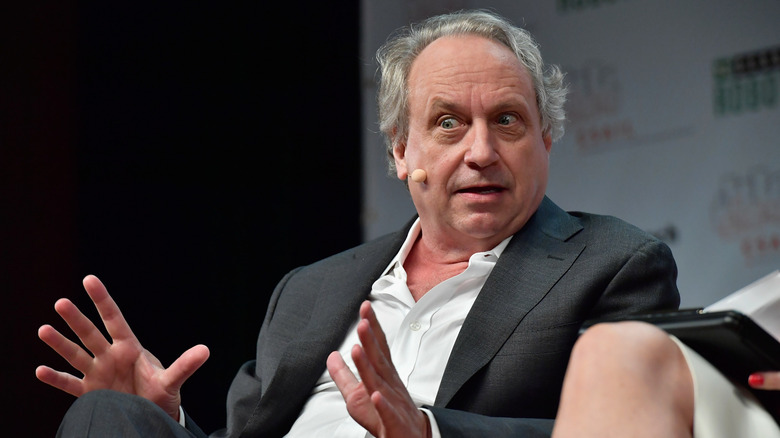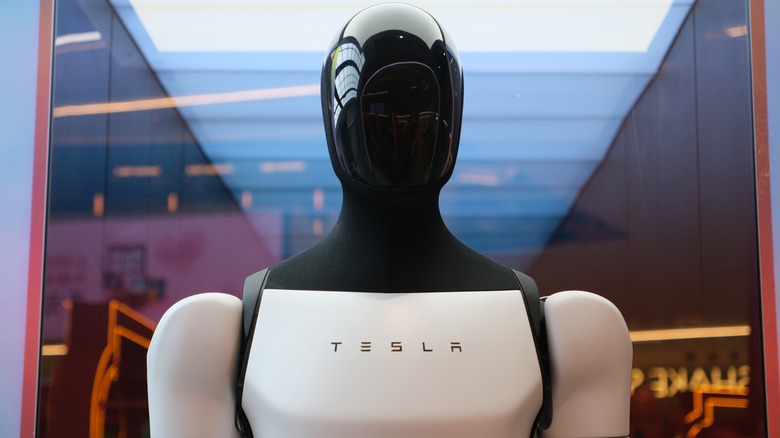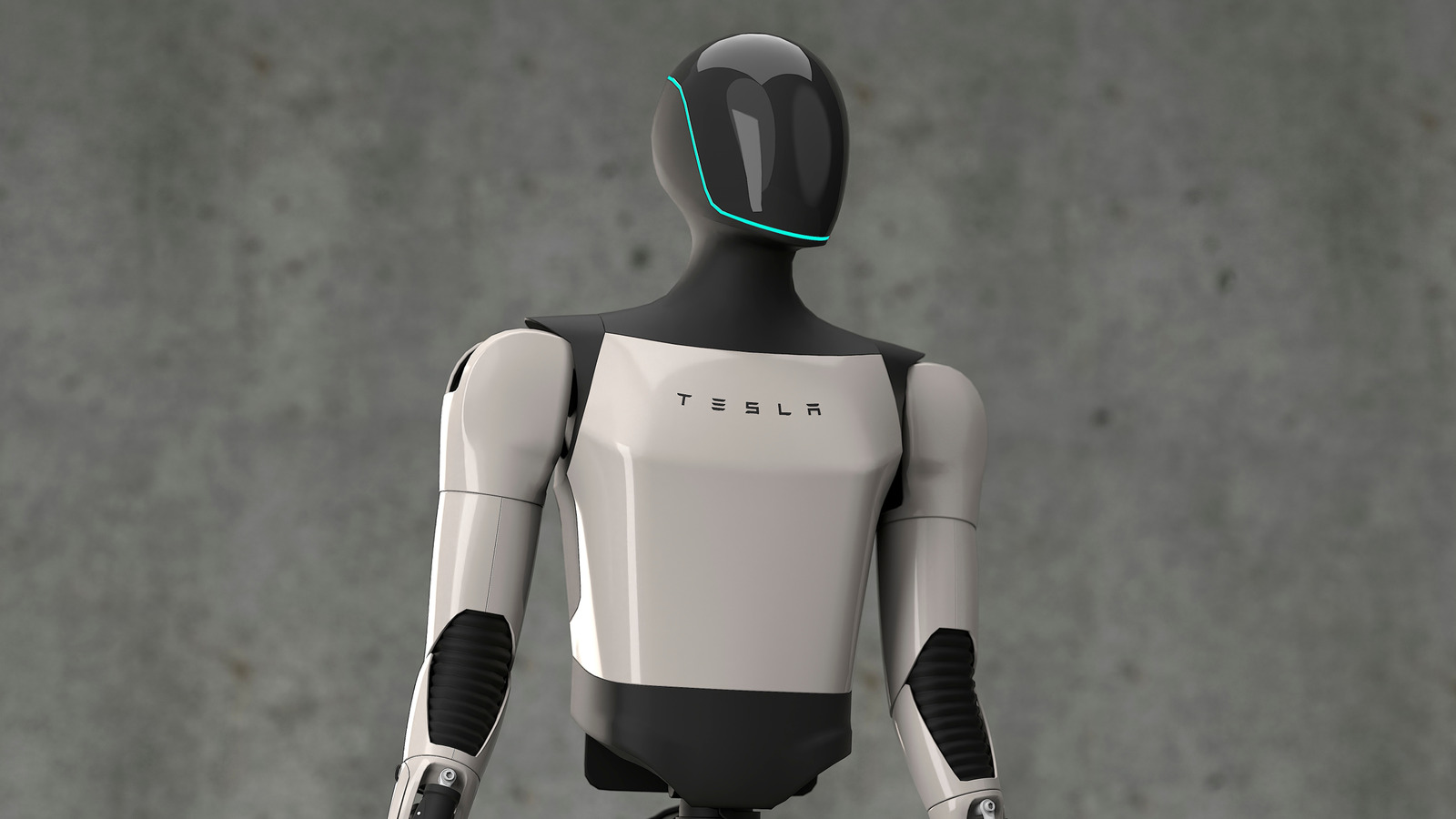 Giovanni Cancemi/Shutterstock
Giovanni Cancemi/Shutterstock
Tesla's Cybercab launch last year is one of those tech events that will live in infamy. Alongside his titular vehicle (which has no steering wheel), DOGE billionaire Elon Musk showed off the latest iteration of Tesla's Optimus robot, a humanoid droid meant to do ... well, it's unclear. Tesla says it will do tasks humans find boring and repetitive. Although dozens of the things were walking around at the Cybercab event, they were later discovered to be remote controlled, meaning the one thing Tesla had accomplished was making a robot that doesn't fall over while walking.
Musk seems to think Optimus will be a massive hit with consumers, and claimed in September that it will account for 80% of Tesla's stock value. He provided no time frame, so we can only assume it will happen sometime in between Tesla full self-driving and porcine aviation. Optimus will have steep competition if it does come to market, with products like XPENG's dystopian-looking humanoid robot, Iron, as well as the controversial 1x NEO humanoid that also needs to be remotely controlled. Leaders in the field aren't giving Musk the benefit of doubt, either. The iRobot co-founder and MIT professor emeritus of robotics Rodney Brooks called Optimus "pure fantasy thinking" in a fiery September blog screed.
Brooks is one of the brains behind the iRobot Roomba robot vacuum and the former director of the MIT Computer Science & Artificial Intelligence Laboratory. He has served as a thesis advisor for 27 robotics PhDs. It's hard to find a more seasoned expert in the field. Here's why he says Tesla — and any other company building human-shaped robots — is approaching the field of robotics from a flawed perspective.
Humanoid robots lack human coordination, MIT robotics professor and CEO warns
 Paul Marotta/Getty Images
Paul Marotta/Getty Images
In his Sept. 26 blog post, Rodney Brooks made a point that other companies like Boston Dynamics have learned the hard way. Just because humans have two arms and legs doesn't mean our robots should. Pop culture is full of human-esque robots, from Data on "Star Trek: The Next Generation." to C-3PO in "Star Wars." Brooks points out that a previous generation of roboticists already fixated on humanoid robots, but only ended up creating specialized limbs for use in factory lines.
Human robots sound good to non-experts, Brooks wrote, because they seem "plug compatible" with us. We imagine that the best robot to take over human labor is one built to human proportions. This is incorrect, he wrote, because we already have robotic interfaces better suited to specific tasks. For instance, many specialized robots use suction cups instead of hands, and five-fingered hands that have been built are not dextrous enough.
We don't give the complexity of our own bodies enough credit. The ability to solve a Rubix cube in seven seconds isn't simply a matter of seeing the cube and manipulating our fingers. We also feel the plastic in our fingers, sense the clicking and turning of the internal hinges, and process all that feedback. Brooks notes that not only can current robotic limbs not sense touch, but once they get good at a certain task, they cannot transfer that skill to another task. For instance, a robot trained to fold a particular shirt can't fold a different shirt without new training. Since that's exactly the approach Tesla is taking, Brooks goes so far as to suggest that the company might be lying to the public and "sandbagging us."
Musk's Optimus robots are the tech mogul's latest far-fetched promise
 Robert Way/Shutterstock
Robert Way/Shutterstock
Brooks suggested that Musk and Tesla might be lying about Optimus robots. His reasoning is that no robotics expert would be unaware of the many flaws endemic to Tesla's stated methods of producing humanoid robots. Musk and company must secretly be using more advanced techniques that produce better results in order to stay ahead of their competitors, Brooks says, but he ultimately takes them at their word.
However, taking Musk at his word has proven a losing bet. Even before The New York Times reported on his struggle with addiction while working alongside the President of the United States, he showed a willingness to lie compulsively (or, at the least, make wildly optimistic projections that just so happened to boost his companies' stocks). Musk's long list of tech failures includes promising that "full self-driving" Tesla vehicles were one or two years away every year since 2015, even as hundreds of Teslas crashed on Autopilot. His hyped "Hyperloop" was supposed to innovate passenger trains by carrying people at mind-blowing speeds. Aside from the fact that bullet trains with incredible speed already exist, reporting eventually revealed the Hyperloop as a scheme to prevent California from building a rail line that would harm Tesla sales. It was literally the plot of the monorail episode of "The Simpsons."
Is Optimus likely to be the first Musk moonshot that makes a landing, or is it another in a long series of stock-boosting schemes? Rodney Brooks doesn't go that far, but his skepticism is an alarm bell.




